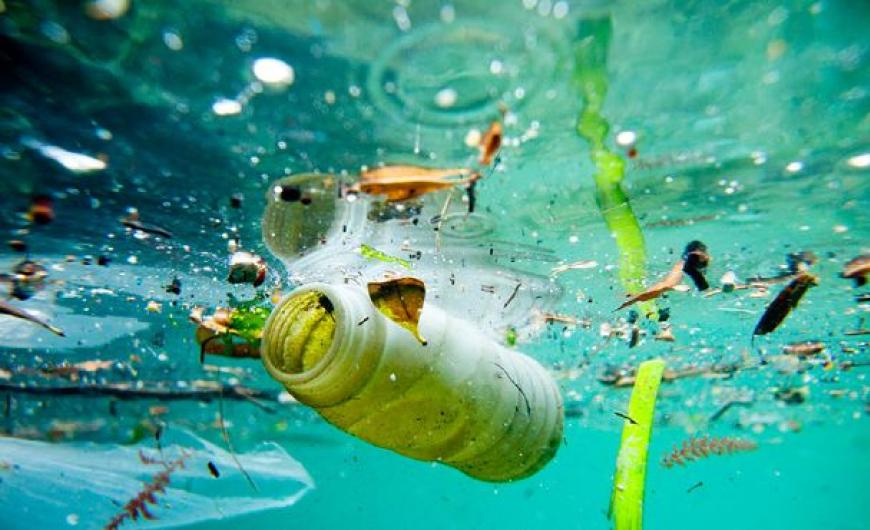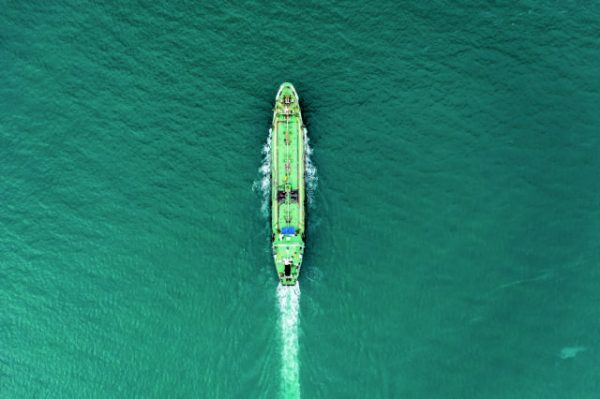
About 3,760 metric tons of plastic are currently floating in the Mediterranean Sea, from its shores and surface to its bottom, according to a new Greek scientific study.
Researchers at the Institute of Oceanography of the Hellenic Center for Marine Research (ELKETHE), led by Dr. Costas Tsiaras, who published the relevant article in the Marine Science journal “Frontiers in Marine Science”, have developed a new model that quantifies waste coming from land (rivers, coastal cities, etc.) and ending up in Mediterranean waters.
Global plastics production has been growing every year since the 1950s. In 2019, an estimated 368 million tons of plastics were produced worldwide. A percentage of them end up in the seas and oceans every year.
Among them, a large number of invisible microplastics (up to five millimeters in size) and macroplastics (over five millimeters) are floating in the Mediterranean, a closed sea with a large problem of plastic pollution. The densely populated coasts, fishing, shipping, tourism etc. contribute to the problem. Given the great marine biodiversity in the Mediterranean, fears are expressed about the conservation of marine ecosystems.
Plastic pollution affects all levels of marine biodiversity, according to Greek researchers. Plastics of all sizes are found on the surface of the Mediterranean, on its shores, on its seabed and in the bodies of fish and other marine organisms. Some of these plastics end up being eaten by humans along with seafood.
Large “load”
ELKETHE scientists estimate that every year the Mediterranean receives a load of about 17,600 tons of plastics, of which 3,760 tons are currently floating in its waters. Of the total plastic pollution, it is estimated that 84% ends up on the beaches and the remaining 16% is dispersed in the water at greater depths or eventually falls to the bottom.
According to Dr. Tsiaras, microplastics are less abundant on the surface of the sea because they sink faster, while larger macroplastics, such as plastic bags, usually float for longer and longer distances. Indicatively, 50 micrometers (millionths of a meter) sink in less than a day, 200 micrometers in 3.5 days, 350 micrometers in two weeks, while those over one millimeter in size usually continuing to float.
Sources of smaller microplastics (up to 300 microns), such as biological treatment plants and wastewater treatment plants, are mainly located near large cities on the west coast of France, Spain and Italy. On the other hand, the largest microplastics (over 300 micrometers) are more common on the coasts of Greece, Turkey, Italy, the Middle Eas,t and North Africa.
Macroplastics abound off the coasts of Algeria, Albania and Turkey, as well as near coastal cities with large populations in France, Spain and Italy.
Latest News

German Ambassador to Greece Talks Ukraine, Rise of Far Right & Tariffs at Delphi Economic Forum X
Commenting on the political developments in his country, the German Ambassador stressed that it was clear the rapid formation of a new government was imperative, as the expectations across Europe showed.

Athens to Return Confiscated License Plates Ahead of Easter Holiday
Cases involving court orders will also be excluded from this measure.

Servicers: How More Properties Could Enter the Greek Market
Buying or renting a home is out of reach for many in Greece. Servicers propose faster processes and incentives to boost property supply and ease the housing crisis.

Greek Easter 2025: Price Hikes on Lamb, Eggs & Sweets
According to the Greek Consumers’ Institute, hosting an Easter dinner for eight now costs approximately €361.95 — an increase of €11 compared to 2024.

FM Gerapetritis Calls for Unified EU Response to Global Crises at EU Council
"Europe is navigating through unprecedented crises — wars, humanitarian disasters, climate emergencies," he stated.

Holy Week Store Hours in Greece
Retail stores across Greece are now operating on extended holiday hours for Holy Week, following their Sunday opening on April 13. The move aims to accommodate consumers ahead of Easter, but merchants remain cautious amid sluggish market activity.

Green Getaway Ideas for Easter 2025 in Greece
Celebrate Easter 2025 in Greece the sustainable way with eco-farms, car-free islands, and family-friendly getaways rooted in nature and tradition.

Civil Protection Minister Details Summer Firefighting Plans at Delphi Forum
At the 10th Delphi Economic Forum, Minister of Climate Crisis and Civil Protection Yiannis Kefalogiannis discussed Greece's plans for the upcoming fire season.

How Shops and Markets Will Operate During Easter Holy Week
The Easter holiday schedule has been in effect since April 10, with retail stores open Palm Sunday, and most supermarkets also operating to meet consumer demand for Easter shopping

Why Is the French Aircraft Carrier Charles De Gaulle in Piraeus?
Docking in Piraeus after a four-month deployment in the Indo-Pacific region, the admiral of the aircraft carrier the Charles de Gaulle says, "Greece is our best partner in the Mediterranean."








































 Αριθμός Πιστοποίησης
Αριθμός Πιστοποίησης